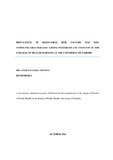| dc.contributor.author | Ndonga, Loise N | |
| dc.date.accessioned | 2017-01-05T06:42:13Z | |
| dc.date.available | 2017-01-05T06:42:13Z | |
| dc.date.issued | 2016-10 | |
| dc.identifier.uri | http://hdl.handle.net/11295/99002 | |
| dc.description.abstract | Introduction
Non-communicable diseases are a major death globally. Kenya is faced by communicable diseases burden alongside a rapid increase in NCDs related morbidity and mortality. Health care workers are considered educators and role models in the area of health promoting behaviours yet studies report that risky health behaviours are prevalent in this population.
Objectives
This study assessed the behavioral risk factors of non-communicable diseases in postgraduate students of the College of Health Sciences at the University of Nairobi.
Materials and methods
The study population was postgraduate students of the College of Health Sciences at the University of Nairobi who are practicing health care workers. The sample size consisted of 329 randomly selected participants. A modified and pre-tested World Health Organization steps questionnaire was the data collection tool.
Results
Three hundred and three participants were recruited (174 men and 129 women). Majority were aged 26-30 years and were married. The prevalence of tobacco smoking was 6.3%, heavy episodic drinking was 1.19%, unhealthy diet was 92.1% and physical inactivity was 32%. Men were more likely to be users of tobacco and alcohol harmfully (p=0.011, p=0.001 respectively). More than 70% of the participants had no clear understanding of World Health Organization recommendations on use of tobacco, alcohol, healthy diet and
physical activity. There was low uptake of non-communicable disease screening services by the participants.
Conclusion
The postgraduate students who are practicing health care workers are exposed to behavioral risk factors for non-communicable diseases with unhealthy diet being the most prevalent factor. There was presence of tobacco use and harmful alcohol use in this population thus demonstrating a need to further investigate the factors contributing to this risk factor exposure. The postgraduate student‟s low level of knowledge on the published WHO guidelines and less than optimal health seeking behaviour calls for improvement in the training, capacity building and mentoring of health oriented postgraduate students both pre-service and in-service in the area of health promoting behaviours. | en_US |
| dc.language.iso | en | en_US |
| dc.publisher | University of Nairobi | en_US |
| dc.rights | Attribution-NonCommercial-NoDerivs 3.0 United States | * |
| dc.rights.uri | http://creativecommons.org/licenses/by-nc-nd/3.0/us/ | * |
| dc.title | Prevalence of behavioral risk factors for non-communicable diseases among postgraduate students in the College of Health Sciences at the University of Nairobi | en_US |
| dc.type | Thesis | en_US |
| dc.description.department | a
Department of Psychiatry, University of Nairobi, ; bDepartment of Mental Health, School of Medicine,
Moi University, Eldoret, Kenya | |


